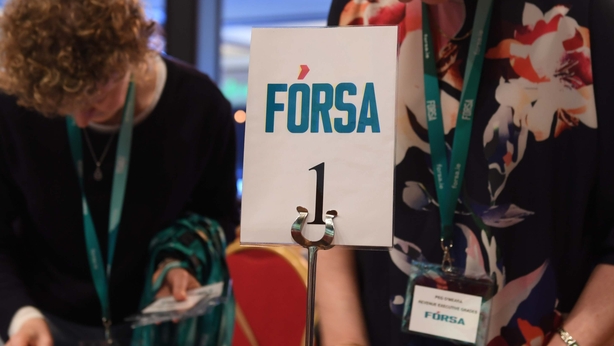The Government is in danger of breaching international law unless Ireland's processes for collective bargaining are strengthened, the Fórsa trade union has claimed.
The warning comes in the union's new report "Collective Benefit - Harnessing the power of representation for economic and social progress", which examines how the framework for employers and unions to negotiate collective agreements on pay and working conditions could be improved.
It compares the Irish situation with France, Denmark, Belgium and the Netherlands and argues that "robust" collective bargaining arrangements can boost consumer demand, economic stability, flexibility and innovation, as well as staving off the prospect of what it calls "radical industrial action".
In 2016, the International Labour Organisation established that in Ireland, just under 25% of workers belonged to the union, with the figure for the private sector even lower at 18%.
Fórsa notes that collective bargaining coverage in Ireland stands at just over 33% (as some non-union workers are covered by sectoral agreements).
Only Greece has a lower rate of coverage among the 14 remaining pre-2004 EU member states, where the average is 73%.
The report attributes this relatively low rate to the effects of the financial crisis, a series of court decisions striking down certain industrial relations laws as unconstitutional, and the voluntarist tradition of industrial relations in Ireland.
"We are near the bottom of the scale on worker representation and participation in economic decision-making.
"The contrast is starker if you look at more modern and progressive countries, and this research shows that we are close to non-compliance with international law on the right to be represented by a trade union," said Fórsa General Secretary Kevin Callinan.

A proposed EU Directive on the Minimum Wage, if enacted, would oblige member states to take measures to boost coverage to a target of 70%.
The Government has established a high-level working group under the auspices of the Labour Employer Economic forum to examine how collective bargaining could be developed in ways consistent with competitiveness.
However, it has also faced criticism for joining with eight other member states in seeking to dilute the proposed EU Directive on the Minimum Wage to a recommendation, on the grounds that it would give governments more flexibility.
Fórsa urged the Government to "harness the productive power of sectoral bargaining to improve wage levels, pay equality, as well as creating conditions to improve productivity, boost demand, enhance innovation, and deliver greater stability for businesses and their staff".
Mr Callinan noted that internationally a "change of mood" was under way, with the Biden administration in the US beefing up collective bargaining rights, and EU Commission President Ursula von der Leyen promoting the concept in her State of the European Union address.
"By contrast, the Irish Government remains out of kilter with this new mood," Mr Callinan said.
He referred to the "collective benefit" to be derived for both staff, employers, society and the economy as a whole.
"OECD countries with integrated and sophisticated collective bargaining systems generally enjoy higher wages across the economy, with lower levels of income inequality.
"It puts a brake on the huge reward disparities and gender pay gaps associated with countries where worker engagement and representation are weak," Mr Callinan said.
"Ireland could be at the forefront of efforts to ensure that decent, secure employment, with manageable work-life balance and strong workplace democracy, is central to this inescapable new frontier for global competitiveness."





